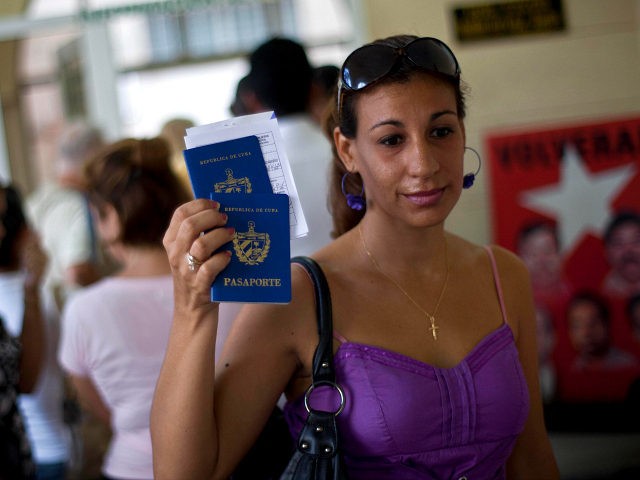The U.S. State Department rejected four of every five requests from Cuban nationals for a tourism or business visa in the 2016 fiscal year, a year in which incidents of violent communist oppression skyrocketed following President Barack Obama’s friendly visit to dictator Raúl Castro in March.
“Cuba has the distinction of having the highest rate of U.S. B Visa (tourism or business) refusals of any country worldwide” in the past year, according to Forbes, citing U.S. State Department statistics. Cuba beat out war-torn and impoverished countries including Liberia, Afghanistan, and Haiti, which also appeared in the top ten.
The State Department rejected 81.9 percent of Cuban national requests for B-type visas. MarketWatch notes that this is a 5-point increase from fiscal year 2015 when the United States rejected 76 percent of such requests. Martí Noticias notes that this affected over 8,000 Cubans attempting to come into the United States on a temporary basis but that, among those granted visas – A-type “government” ones – were 392 Cuban government diplomats or other employees. Another 818 athletes received P-type visas.
A State Department spokesman explained, according to Martí, that the department believes the reduction in visas granted “coincides with the extension, from six months to two years, of the time that a B2 visa is valid for Cuban nationals,” insisting that the higher number of requests in the past included requests for extensions, not just first-time visas. “As these travelers now have visas that are valid for more time, they do not need to renew them as frequently,” the spokesman explained.
While Cubans have traditionally requested such visas in high numbers due to a combination of factors – flight from communist oppression, visits to family in the large Cuban-American exile community, among others – the State Department’s statistics show a major drop in the number of visas granted between 2014 and 2015. This is a percentage drop, which would indicate that the State Department is not merely granting fewer visas because it is receiving fewer requests, but that it is rejecting a higher proportion of the number of visas requests coming in.
In 2014, the State Department granted 66.2 percent of Cuban B-type visa requests. In 2015, that number shot up to 76.03 percent. 2014 was the year with the highest number of visas granted to Cubans in the past decade, according to Martí.
In December 2014, President Obama announced that he had chosen to radically transform the White House’s policy towards Cuba, re-establishing diplomatic ties with the communist regime and expanding opportunities for American big business on the island. The president did not demand any changes in the economic, political, or human rights situation of the country for this move, and Raúl Castro explicitly stated he would give “nothing in return” for these changes, instead demanding more: the closing of U.S. media outlets like Martí Noticias and control of the Guantánamo Bay military base.
The policy change triggered a massive rise in the number of Cubans attempting to reach the United States, both by land and sea. The Coast Guard documented a 117-percent increase in the number of Cubans found on the high seas attempting to reach America between December 2013 and December 2014. An estimated 100,000 Cuban nationals reached the U.S. through the Mexican border between 2012 and 2016. Before January 2017, all Cubans who reached U.S. soil were considered legally present in the country, due to the political persecution prevalent on the island. President Obama changed this, ending the longstanding “wet foot/dry foot” policy as one of his final acts in office.
Ending the policy triggered mass confusion at key U.S. airports such as Miami International, where U.S. Customs and Border Patrol apprehended Cubans arriving at the airport with legal U.S. visas – many the B-types that have become more difficult to acquire for Cubans under President Obama. According to Cuban-American activists, U.S. authorities detained legally present Cuban nationals for hours without legal basis. “Those being detained within the airport include people of advanced age, including one blind man, many of them ill,” Ramón Saúl Sánchez, a Cuban-American activist who Obama’s government threatened with deportation despite decades legally residing in the country, said in January.
At the Mexican border, Cuban nationals found themselves stranded in the hands of the notorious Mexican immigration officials, urging the international community to fight for their rights as refugees not to return to the oppressive yoke of communism. Those there noted that Cuban-Americans, unlike many refugees and immigrants in the U.S., tend to vote for conservative candidates and supported President Donald Trump in large numbers during the 2016 election.
“Obama, because he is leaving, suddenly takes up the idea of repealing a law that has been enforced for many years and has favored many Cubans. I think he got angry with the Cubans,” Cuban refugee Jose Enrique Manresa told reporters at the Mexican border.
Conservatives in the Cuban-American community also condemned Obama supporters who did not speak up for the rights of Cubans legally present in the United States following the repeal of wet foot/dry foot but condemned President Trump for enacting policies to screen travelers from terror-prone countries.
Florida Congressman Mario Diaz-Balart, for example, condemned the “double standard and hypocrisy” of liberals who celebrated the end of a policy designed to protect refugees, while condemning conservatives for protecting the homeland. Similarly, this week, the Cuban interest site Babalú Blog compared the “unhinged hysterics of the American left over President Trump’s so-called ‘Muslim ban'” to the relative silence in the face of a surge of rejections of tourist and business visa requests for Cubans.

COMMENTS
Please let us know if you're having issues with commenting.